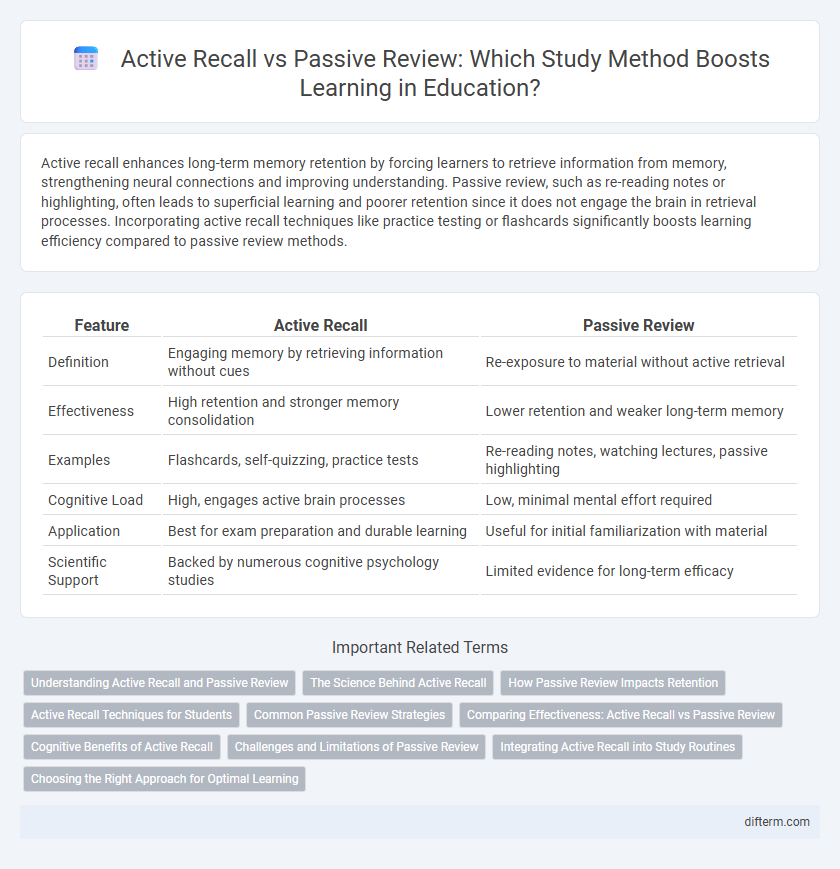Active recall enhances long-term memory retention by forcing learners to retrieve information from memory, strengthening neural connections and improving understanding. Passive review, such as re-reading notes or highlighting, often leads to superficial learning and poorer retention since it does not engage the brain in retrieval processes. Incorporating active recall techniques like practice testing or flashcards significantly boosts learning efficiency compared to passive review methods.
Table of Comparison
| Feature | Active Recall | Passive Review |
|---|---|---|
| Definition | Engaging memory by retrieving information without cues | Re-exposure to material without active retrieval |
| Effectiveness | High retention and stronger memory consolidation | Lower retention and weaker long-term memory |
| Examples | Flashcards, self-quizzing, practice tests | Re-reading notes, watching lectures, passive highlighting |
| Cognitive Load | High, engages active brain processes | Low, minimal mental effort required |
| Application | Best for exam preparation and durable learning | Useful for initial familiarization with material |
| Scientific Support | Backed by numerous cognitive psychology studies | Limited evidence for long-term efficacy |
Understanding Active Recall and Passive Review
Active recall involves actively retrieving information from memory, which strengthens neural connections and enhances long-term retention. Passive review, such as rereading notes or highlighting text, offers less cognitive engagement and often leads to weaker memory consolidation. Research shows that active recall methods, like practice testing, consistently outperform passive review in promoting deep learning and understanding.
The Science Behind Active Recall
Active recall strengthens memory retention by forcing the brain to retrieve information, reinforcing neural pathways more effectively than passive review, which involves merely re-exposing the brain to material. Research in cognitive psychology reveals that retrieval practice increases synaptic plasticity, enhancing long-term consolidation of learned content. This method outweighs passive techniques like rereading or highlighting, which activate recognition but fail to engage deeper, effortful memory processing necessary for durable learning.
How Passive Review Impacts Retention
Passive review, such as rereading notes or highlighting text, often leads to shallow cognitive processing and weaker memory retention compared to active recall techniques. This method reinforces familiarity without challenging the brain to retrieve information, resulting in lower long-term retention rates. Research in educational psychology consistently shows that passive review slows knowledge consolidation and reduces the effectiveness of study sessions.
Active Recall Techniques for Students
Active recall techniques significantly enhance memory retention by requiring students to retrieve information from memory, rather than passively re-reading or highlighting text. Methods such as flashcards, practice tests, and self-quizzing promote deeper cognitive processing and strengthen neural connections essential for long-term learning. Research shows that active recall improves exam performance by increasing information accessibility and reducing forgetting.
Common Passive Review Strategies
Common passive review strategies in education include rereading textbooks, highlighting notes, and watching lecture videos without engagement. These approaches often lead to superficial learning and poor information retention compared to active recall techniques. Studies show that passive review lacks the cognitive effort necessary to strengthen memory pathways effectively.
Comparing Effectiveness: Active Recall vs Passive Review
Active recall significantly improves long-term retention by forcing learners to retrieve information from memory, strengthening neural pathways. Passive review, such as rereading or highlighting, often leads to superficial familiarity without deep understanding or durable memory formation. Research consistently shows active recall outperforms passive review in boosting exam performance and enhancing knowledge retention over time.
Cognitive Benefits of Active Recall
Active recall significantly enhances long-term memory retention by engaging the brain in retrieving information, which strengthens neural connections more effectively than passive review methods. Research shows that students who use active recall experience improved critical thinking and problem-solving skills due to deeper cognitive engagement. This method also reduces cognitive load during exams, making information retrieval faster and more efficient.
Challenges and Limitations of Passive Review
Passive review often fails to engage critical cognitive processes, leading to poor long-term retention and superficial understanding of educational material. It limits the learner's ability to effectively retrieve information under exam conditions, as it lacks the retrieval practice necessary for strengthening memory connections. The challenge with passive review lies in its tendency to promote rote memorization rather than deeper comprehension, which can result in decreased academic performance and motivation over time.
Integrating Active Recall into Study Routines
Integrating active recall into study routines enhances memory retention by prompting learners to retrieve information without cues, strengthening neural pathways more effectively than passive review methods like rereading or highlighting. Techniques such as flashcards, practice tests, and teaching material to others promote active engagement and deeper learning. Consistent use of active recall reduces cognitive overload and improves long-term academic performance across various subjects.
Choosing the Right Approach for Optimal Learning
Active recall enhances memory retention by forcing learners to retrieve information, strengthening neural connections more effectively than passive review. Passive review, such as rereading notes or watching lectures, provides familiarity but often leads to superficial learning and lower long-term retention rates. Selecting active recall techniques like flashcards, practice tests, or teaching others optimizes cognitive engagement and improves exam performance significantly in educational settings.
active recall vs passive review Infographic

 difterm.com
difterm.com